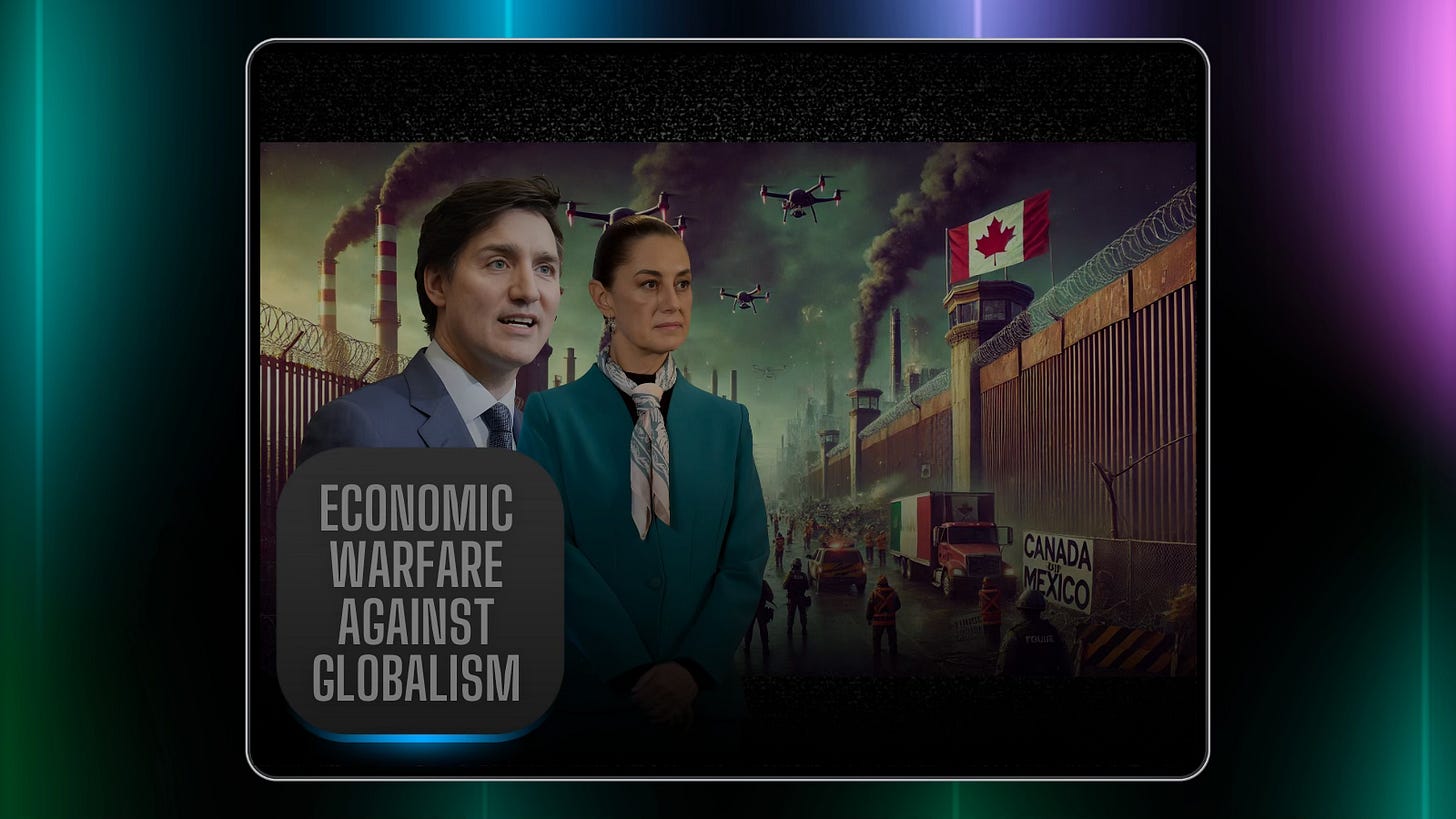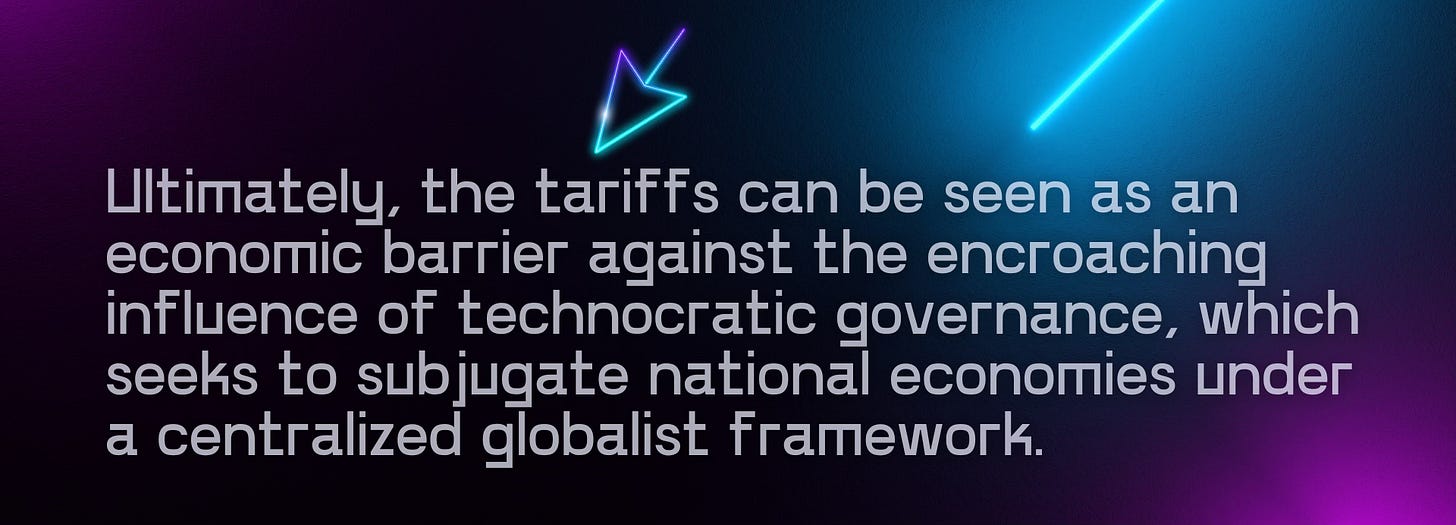Can Trump's tariffs serve as an effective countermeasure against the globalist agenda?
Canada and Mexico's role as compliant nodes in the globalist system.
This article will explore the exercise of economic warfare.
Trump’s tariffs on Canada and Mexico can be seen as a strategic countermeasure against the globalist Agenda 21 plans, which seek to erode national sovereignty through economic interdependence, environmental regulations, and technocratic control.
Seen & Heard
Canada and Mexico: Trump's 25% across-the-board tariffs on its US neighbors go into effect on Tuesday, March 4, after the president ruled out another delay to implementation. Canada retaliated with a package of tariffs on $107 billion of US products, some immediate. Mexico's president said it would announce retaliatory tariffs beginning on Sunday. —YahooFinance
What’s Happening - Mexico
President Donald Trump's decision to impose 25% tariffs on Mexican imports was officially justified by concerns over illegal immigration, drug trafficking—particularly fentanyl—and trade imbalances. The administration aimed to pressure Mexico into taking more stringent actions to curb these issues, thereby enhancing U.S. national security and encouraging domestic manufacturing by making foreign goods more expensive. Source:AP
One can speculate that Trump’s broader trade policies reflect a resistance to globalist ideologies. This suggests that the tariffs can be seen as a stance against policies perceived as aligning with global collectivism, aiming to reassert national sovereignty and protect domestic industries.
Mexico has fallen to club Davos
Claudia Sheinbaum Pardo was born on June 24th, 1962, in Mexico City, into a secular Jewish family. Her paternal Ashkenazi grandparents emigrated from Lithuania to Mexico in the 1920s, while her maternal Sephardic grandparents fled Sofia, Bulgaria, in the 1940s to escape the Holocaust. She grew up celebrating major Jewish holidays at her grandparents' homes.
A scientist by profession, Sheinbaum earned a doctorate in energy engineering from the National Autonomous University of Mexico (UNAM). She has authored over 100 articles and two books on energy, environment, and sustainable development. She contributed to the United Nations Intergovernmental Panel on Climate Change (IPCC) and was included in the BBC’s 100 Women list in 2018. She has also published more than 20 scientific articles on energy efficiency, contributing to the 2007 IPCC report—the same year the IPCC won a Nobel Peace Prize.

Stanford Archive | Salinas addresses 'inner revolution' - Protesters descry 'fraudulent' government
Beyond her academic credentials, Sheinbaum has actively pushed globalist and leftist policies. In 2021, she removed a statue of Christopher Columbus from Mexico City’s Paseo de la Reforma as part of a "decolonization" initiative, aligning with broader Marxist historical revisionism.
During her tenure as Mexico City’s leader, Sheinbaum has championed LGBT policies, including implementing a gender-neutral uniform policy in state-run schools in 2019, allowing students to dress according to their chosen gender identity—a step aligned with progressive social engineering agendas.
On June 2, 2024, Sheinbaum made history by becoming Mexico’s first female and first Jewish president, further cementing the country’s shift toward leftist, globalist policies.
Claudia Sheinbaum's academic and political background reflects a deep alignment with globalist, socialist, and Marxist ideologies. From her UN-backed climate advocacy to her "decolonization" efforts, her policies mirror the broader communist-globalist agenda that seeks to redefine national identity, erase historical roots, and impose progressive social doctrines. Her pro-LGBT stance, climate activism, and historical revisionism are hallmarks of the global left's push to reshape societies through ideological subversion.
Now, as president, she is set to continue transforming Mexico under the framework of globalist socialist technocrat tyranny.
Canada’s Capture by Global Collectivism & Technocratic Control
Donald Trump's tariffs on Canada, particularly the tariffs on steel and aluminum under Section 232 (2018), were publicly justified as a measure to protect U.S. national security and domestic industries. However, when viewed through the lens of global collectivism and technocratic control, a deeper strategic rationale emerges.
Justin Trudeau is a graduate of the World Economic Forum's (WEF) Young Global Leaders program and a staunch advocate of the United Nations’ 2030 Agenda and its 17 Sustainable Development Goals (SDGs). His administration has consistently pushed policies aligned with the globalist agenda, including:
Climate mandates that restrict industry through carbon taxes and “green” energy transitions.
Censorship laws under the guise of “online safety” to control narratives.
COVID-era authoritarian measures, including travel bans and vaccine mandates.
Push for Digital IDs and Central Bank Digital Currencies (CBDCs)—steps toward technocratic social control.
Trump’s Tariffs as Economic Warfare Against Globalist Control
Trump’s tariffs on Canadian steel and aluminum can be speculated as a countermeasure against Canada’s role as a compliant node in the globalist system. If Canada was being used as a conduit for technocratic supply chain controls—such as carbon-regulated trade and globalist manufacturing dependencies—the tariffs may serve to:
Undermine WEF-aligned economic influence – Canada’s deep entrenchment in the WEF and UN sustainability mandates means its industries were becoming vassals of the global economic restructuring rather than free-market participants. Tariffs would limit the economic interdependence that globalists use to erode national sovereignty.
Disrupt the “Green Transition” chokehold – By hitting Canada’s aluminum and steel industries, the tariffs can be a preemptive strike against ESG-driven supply chain control, which seek to limit Western manufacturing through climate regulations and reliance on foreign production.
Expose Canada’s compromised sovereignty – Trudeau’s Canada operates less like a sovereign nation and more like a managerial state within the globalist system. The tariffs force Canada to either negotiate in national interest or expose its allegiance to supranational governance bodies like the UN and WEF.
Tariffs as a Check on Globalist Trade Structures
While the public rationale for Trump’s tariffs on Canada is framed around economic fairness and national security, the broader context suggests they are also a strategic move against the globalist technocratic agenda. Canada, under Trudeau’s leadership, has willingly surrendered its economic and governance policies to global collectivist institutions, positioning itself as a tool for the Great Reset agenda.
By imposing tariffs, Trump can seek to:
Reduce U.S. economic entanglement with a captured state.
Force Canada to reassess its alignment with WEF policies.
Reinforce U.S. manufacturing independence against the globalist push for controlled supply chains.
Ultimately, the tariffs can be seen as an economic barrier against the encroaching influence of technocratic governance, which seeks to subjugate national economies under a centralized globalist framework.
Trump’s tariffs on Canada and Mexico can be seen as a strategic countermeasure against the globalist Agenda 21 plans, which seek to erode national sovereignty through economic interdependence, environmental regulations, and technocratic control.
By imposing trade barriers on key industries like steel, aluminum, and manufacturing, Trump disrupts the global supply chain mechanisms that organizations like the UN, WEF, and WTO use to enforce climate mandates, carbon restrictions, and trade dependencies under the guise of “sustainability.” His tariffs force these nations to reassess their economic reliance on globalist trade structures while reinforcing American industrial independence, a direct challenge to the Agenda 21 blueprint for economic centralization and managed decline of Western industry.
In targeting Mexico—a nation shifting towards collectivist governance—and Canada, deeply embedded in WEF-aligned technocracy, Trump’s tariffs slow the Great Reset’s economic restructuring and provide a nationalist pushback against the erosion of self-sustaining economies.
While not a complete dismantling of Agenda 21, these tariffs are a roadblock to the globalist agenda, proving that national economies can resist the forces of supranational control.







